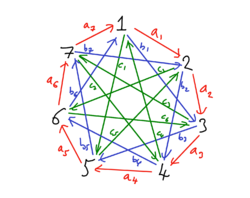Difference between revisions of "M(8,5,4)"
m |
|||
| Line 33: | Line 33: | ||
\end{array}\right)</math> | \end{array}\right)</math> | ||
|O-morita-frob = 1 | |O-morita-frob = 1 | ||
| − | |Pic-O = <math>C_7</math><ref>See [[References#B|[BKL18]]]</ref> | + | |Pic-O = <math>C_7 : C_3</math><ref>See [[References#B|[BKL18]]]</ref> |
|PIgroup = <math>S_7 \times C_2</math><ref>Using GAP programme from [[References#R|[Ru11]]].</ref> | |PIgroup = <math>S_7 \times C_2</math><ref>Using GAP programme from [[References#R|[Ru11]]].</ref> | ||
|source? = No | |source? = No | ||
Latest revision as of 09:09, 5 June 2019
| Representative: | [math]k((C_2 \times C_2 \times C_2):C_7)[/math] |
|---|---|
| Defect groups: | [math]C_2 \times C_2 \times C_2[/math] |
| Inertial quotients: | [math]C_7[/math] |
| [math]k(B)=[/math] | 8 |
| [math]l(B)=[/math] | 7 |
| [math]{\rm mf}_k(B)=[/math] | 1 |
| [math]{\rm Pic}_k(B)=[/math] | |
| Cartan matrix: | [math]\left( \begin{array}{ccccccc} 2 & 1 & 1 & 1 & 1 & 1 & 1 \\ 1 & 2 & 1 & 1 & 1 & 1 & 1 \\ 1 & 1 & 2 & 1 & 1 & 1 & 1 \\ 1 & 1 & 1 & 2 & 1 & 1 & 1 \\ 1 & 1 & 1 & 1 & 2 & 1 & 1 \\ 1 & 1 & 1 & 1 & 1 & 2 & 1 \\ 1 & 1 & 1 & 1 & 1 & 1 & 2 \\ \end{array} \right)[/math] |
| Defect group Morita invariant? | Yes |
| Inertial quotient Morita invariant? | Yes |
| [math]\mathcal{O}[/math]-Morita classes known? | Yes |
| [math]\mathcal{O}[/math]-Morita classes: | [math]\mathcal{O} ((C_2 \times C_2 \times C_2):C_7)[/math] |
| Decomposition matrices: | [math]\left( \begin{array}{ccccccc} 1 & 0 & 0 & 0 & 0 & 0 & 0 \\ 0 & 1 & 0 & 0 & 0 & 0 & 0 \\ 0 & 0 & 1 & 0 & 0 & 0 & 0 \\ 0 & 0 & 0 & 1 & 0 & 0 & 0 \\ 0 & 0 & 0 & 0 & 1 & 0 & 0 \\ 0 & 0 & 0 & 0 & 0 & 1 & 0 \\ 0 & 0 & 0 & 0 & 0 & 0 & 1 \\ 1 & 1 & 1 & 1 & 1 & 1 & 1 \\ \end{array}\right)[/math] |
| [math]{\rm mf}_\mathcal{O}(B)=[/math] | 1 |
| [math]{\rm Pic}_{\mathcal{O}}(B)=[/math] | [math]C_7 : C_3[/math][1] |
| [math]PI(B)=[/math] | [math]S_7 \times C_2[/math][2] |
| Source algebras known? | No |
| Source algebra reps: | |
| [math]k[/math]-derived equiv. classes known? | Yes |
| [math]k[/math]-derived equivalent to: | M(8,5,5) |
| [math]\mathcal{O}[/math]-derived equiv. classes known? | Yes |
| [math]p'[/math]-index covering blocks: | |
| [math]p'[/math]-index covered blocks: | |
| Index [math]p[/math] covering blocks: |
Contents
Basic algebra
Quiver: [math]a_1:\lt 1,2\gt , a_2:\lt 2,3\gt [/math], [math]a_3:\lt 3,4\gt , a_4:\lt 4,5\gt [/math], [math]a_5:\lt 5,6\gt , a_6:\lt 6,7\gt , a_7:\lt 7,1\gt [/math], [math]b_1:\lt 1,3\gt , b_2:\lt 2,4\gt [/math], [math]b_3:\lt 3,5\gt , b_4:\lt 4,6\gt [/math], [math]b_5:\lt 5,7\gt , b_6:\lt 6,1\gt , b_7:\lt 7,2\gt [/math], [math]c_1:\lt 1,5\gt , c_2:\lt 2,6\gt [/math], [math]c_3:\lt 3,7\gt , c_4:\lt 4,1\gt [/math], [math]c_5:\lt 5,2\gt , c_6:\lt 6,3\gt , c_7:\lt 7,4\gt [/math][3]
Relations w.r.t. [math]k[/math]: [math]a_1a_2=a_2a_3=a_3a_4=a_4a_5=a_5a_6=a_6a_7=a_7a_1=0[/math], [math]b_1b_3=b_2b_4=b_3b_5=b_4b_6=b_5b_7=b_6b_1=b_7b_2=0[/math], [math]c_1c_5=c_2c_6=c_3c_7=c_4c_1=c_5c_2=c_6c_3=c_7c_4=0[/math], [math]a_1b_2=b_1a_3[/math], [math]a_2b_3=b_2a_4[/math], [math]a_3b_4=b_3a_5[/math], [math]a_4b_5=b_4a_6[/math], [math]a_5b_6=b_5a_7[/math], [math]a_6b_7=b_6a_1[/math], [math]a_7b_1=b_7a_2[/math], [math]a_1c_2=c_1a_5[/math], [math]a_2c_3=c_2a_6[/math], [math]a_3c_4=c_3a_7[/math], [math]a_4c_5=c_4a_1[/math], [math]a_5c_6=c_5a_2[/math], [math]a_6c_7=c_6a_3[/math], [math]a_7c_1=c_7a_4[/math], [math]b_1c_3=c_1b_5[/math], [math]b_2c_4=c_2b_6[/math], [math]b_3c_5=c_3b_7[/math], [math]b_4c_6=c_4b_1[/math], [math]b_5c_7=c_5b_2[/math], [math]b_6c_1=c_6b_3[/math], [math]b_7c_2=c_7b_4[/math] [math]a_1b_2c_4=b_1c_3a_7=c_1a_5b_6[/math] [math]a_2b_3c_5=b_2c_4a_1=c_2a_6b_7[/math] [math]a_3b_4c_6=b_3c_5a_2=c_3a_7b_1[/math] [math]a_4b_5c_7=b_4c_6a_3=c_4a_1b_2[/math] [math]a_5b_6c_1=b_5c_7a_4=c_5a_2b_3[/math] [math]a_6b_7c_2=b_6c_1a_5=c_6a_3b_4[/math] [math]a_7b_1c_3=b_7c_2a_6=c_7a_4b_5[/math]
Other notatable representatives
Projective indecomposable modules
Labelling the simple [math]B[/math]-modules by [math]S_1, S_2, S_3[/math], the projective indecomposable modules have Loewy structure as follows:
[math]\begin{array}{ccccccc} \begin{array}{c} S_1 \\ S_2 S_3 S_5 \\ S_4 S_6 S_7 \\ S_1 \\ \end{array}, & \begin{array}{ccc} S_2 \\ S_3 S_4 S_6 \\ S_1 S_5 S_7 \\ S_2 \\ \end{array}, & \begin{array}{ccc} S_3 \\ S_4 S_5 S_7 \\ S_1 S_2 S_6 \\ S_3 \\ \end{array} , & \begin{array}{ccc} S_4 \\ S_5 S_6 S_1 \\ S_2 S_3 S_7 \\ S_4 \\ \end{array}, & \begin{array}{ccc} S_5 \\ S_6 S_7 S_2 \\ S_1 S_3 S_4 \\ S_3 \\ \end{array}, & \begin{array}{ccc} S_6 \\ S_7 S_1 S_3 \\ S_2 S_4 S_5 \\ S_6 \\ \end{array}, & \begin{array}{ccc} S_7 \\ S_1 S_2 S_4 \\ S_3 S_5 S_6 \\ S_7 \\ \end{array} \end{array} [/math]
Irreducible characters
All irreducible characters have height zero.
Back to [math]C_2 \times C_2 \times C_2[/math]
